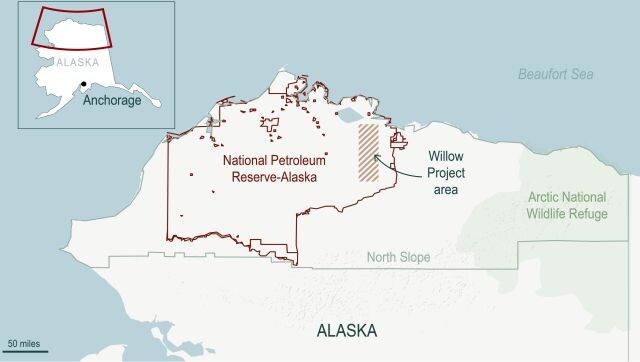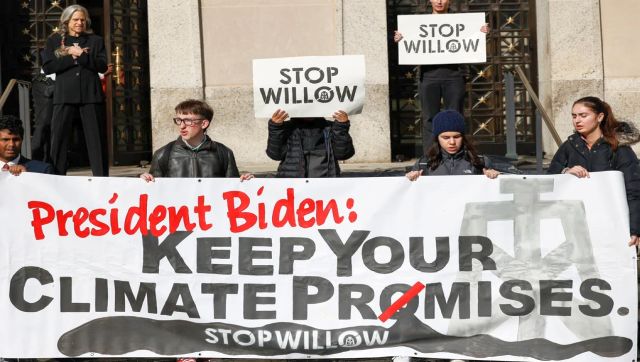Joe Biden approves Alaska’s Willow Project: What is this oil plan and why has it caused such an outrage?
Joe Biden approves Alaska’s Willow Project: What is this oil plan and why has it caused such an outrage?

Pristine federal land in Alaska will soon be the site of oil drilling after United States president Joe Biden approved the $8 billion (Rs 65,877 crore) Willow Project on the North Slope of Alaska, much to the ire of environmentalists and activists.
The massive oil drilling project has galvanised an uprising of online activism against it, despite supporters saying it represents an economic lifeline for Indigenous communities in the region. More than one million letters have been written to the White House against the project and a Change.org petition has garnered more than 2.9 million signatures.
But what is the project and why are so many against it?
What’s Willow all about?
The Willow Master Development Plan was first announced in 2017 by ConocoPhillips, Alaska’s largest crude oil producer to drill oil inside the National Petroleum Reserve in Alaska.
The oil giant states that at its peak the drilling will produce 180,000 barrels of oil per day — about 1.5 per cent of total US oil production. The project is also expected to deliver up to $17 billion in revenue for federal, state and local governments, and create over 2,800 jobs. However, it will take several years for the oil to be made available for consumption as the construction of the project is yet to commence.
It will now be the biggest oil field in the US in decades.
Initially, the full project had been approved by the Trump administration years ago, but an Alaskan federal judge in 2021 had reversed that decision, citing the environmental impact of the project.
What has been approved?
ConocoPhillips Alaska had proposed five drilling sites as part of the project. However, Biden’s Interior Department on Monday approved a version of the project that would include three drill sites and less surface infrastructure than originally proposed. The Interior Department said the reduced scope of the project would minimalise impact on habitats for species such as the polar bear and yellow-billed loons.
The White House said that the new plan would bar drilling in nearly three million acres of the Beaufort Sea — closing it off from oil exploration — and limit drilling in more than 13 million acres in the National Petroleum Reserve. The withdrawal of the offshore area ensures that important habitat for whales, seals, polar bears and other wildlife “will be protected in perpetuity from extractive development,″ the White House said in a statement.

Who supports the project?
The Willow Project, located in the federally designated National Petroleum Reserve-Alaska, enjoys political support in the state. Alaska Native state lawmakers recently met with Interior Secretary Deb Haaland to urge support for Willow.
On 3 March, all three lawmakers in Alaska’s bipartisan congressional delegation met with President Joe Biden and his senior advisers, urging the administration to approve the project. In an opinion piece for CNN too, they wrote: “We all recognise the need for cleaner energy, but there is a major gap between our capability to generate it and our daily needs.”
“Even those who practice a subsistence lifestyle in Alaska — living primarily off the land and water — rely on boats, snowmachines and ATVs, and those all need fuel. In rural parts of our state, gasoline prices have been as high as $18 a gallon.”
In their support for the project, they tout it as a much-needed investment in the region’s communities. Moreover, they argue that it would help boost domestic energy production and lessen the country’s reliance on foreign oil.
Senator Lisa Murkowski, R-Alaska, said the Biden government’s decision was “very good news for the country.” “Not only will this mean jobs and revenue for Alaska, it will be resources that are needed for the country and for our friends and allies,” Murkowski said. “The administration listened to Alaska voices. They listened to the delegation as we pressed the case for energy security and national security.”
Some Native Alaskan leaders have also expressed support for the project. Leaders for Voice of the Arctic, a coalition of Inupiat North Slope leaders, have called the project balanced and said that it would benefit from taxes, allowing them to invest in infrastructure and provide public services.

But, then why the opposition?
However, the Willow Project has met with stiff resistance from climate activists and Monday’s approval for the project invited outrage from environmentalists.
Some Alaska Natives, who will be closer to the proposed plan, are concerned about the health and environmental impacts of the oil drilling. In a letter to Interior Secretary Deb Haaland, Nuiqsut Mayor Rosemary Ahtuangaruak and two other Nuiqsut city and tribal officials said that the village would bear the brunt of health and environmental impacts from Willow. Other “villages get some financial benefits from oil and gas activity but experience far fewer impacts that Nuiqsut,” the letter reads. “We are at ground zero for the industrialisation of the Arctic.”
Moreover, climate activists worry about the environmental impact of Willow project. According to estimates, Willow project would generate enough oil to release 9.2 million metric tonnes of planet-warming carbon pollution a year.
Also read: The countries most vulnerable to climate change: Where does India stand?
Climate activists also state that the oil project is expected to create about 260 metric tonnes of greenhouse gases over its lifespan, the equivalent of creating about 70 new coal-fired power plants.
Environmental charity Sierra Club in a statement said, “It’s the wrong move and will be a disaster for wildlife, lands, communities, and our climate.”
TikTok has also been abuzz with #StopWillow, with climate activists using the platform to express their opposition to the project. In the past few weeks, hashtags like #willowproject, #stopwillow and #stopthewillowproject have appeared in TikTok’s daily top 10 lists, beating out hot celebrity feuds and universal trends. In fact, posts tagged with #willowproject have attracted over 88 million US views in the last month alone.
Climate activists cried foul on Monday after Biden gave his nod for the project, stating that it went against his pledges to lead on climate action. In 2020, during his presidential campaign, Biden had vowed to end new oil and gas drilling on federal lands.
Lena Moffitt, executive director of Evergreen Action, a climate group, in a Guardian report, said: “Approving the Willow Project is an unacceptable departure from President Biden’s promises to the American people on climate and environmental justice. After all that this administration has done to advance climate action and environmental justice, it is heartbreaking to see a decision that we know will poison Arctic communities and lock in decades of climate pollution we simply cannot afford.”

Sonia Ahkivgak, social outreach coordinator at the Sovereign Iñupiat for a Living Arctic group, also expressed dismay over Biden’s decision. “The Biden administration’s approval makes it clear that its call for climate action and the protection of biodiversity is talk, not action. “The only reasonable solution to the climate emergency is to deny new fossil fuel projects like Willow. Our fight has been long and also it has only begun. We will continue to call for a stop to Willow because the lives of local people and future generations depend on it,” she was quoted as saying in a Guardian report.
Former US vice-president Al Gore also stated that projects of its kind are “recklessly irresponsible” and that allowing it would cause “climate chaos”.
Varshini Prakash, executive director of the Sunrise Movement, a youth-led climate change advocacy group, in a New York Times report also cited that the decision was antithetical to Biden’s climate pledges. “President Biden’s decision to move forward with the Willow Project abandons the millions of young people who overwhelmingly came together to demand he stop the project and protect our futures.”
What’s next?
Some environmental groups have said that they would sue to stop the project. At the same time, political pundits believe that the move has been taken keeping an eye on the 2024 presidential elections.
The move, according to some analysts, could help Biden with moderates and independents, given the elevated gas prices amid the Russia-Ukraine war. “I think the White House feels the president has strong climate credentials now, but that he does need to reach out to working class voters in swing states who care about gasoline prices,” Paul Bledsoe, a former climate aide in the Clinton administration who now works at the Progressive Policy Institute, a think tank, told New York Times.
With inputs from agencies
Read all the Latest News, Trending News, Cricket News, Bollywood News,
India News and Entertainment News here. Follow us on Facebook, Twitter and Instagram.






















